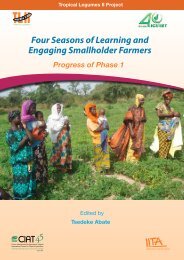Four Seasons of Learning and Engaging Smallholder Farmers - icrisat
Four Seasons of Learning and Engaging Smallholder Farmers - icrisat
Four Seasons of Learning and Engaging Smallholder Farmers - icrisat
Create successful ePaper yourself
Turn your PDF publications into a flip-book with our unique Google optimized e-Paper software.
Table 8-12: Details <strong>of</strong> participation in production technology<br />
Country Training focus Participants<br />
Tanzania Chickpea production <strong>and</strong> storage, PVS 48 extension <strong>and</strong> collaborating NGOs staff<br />
approach <strong>and</strong> facilitation, basic data<br />
collection skills<br />
Ethiopia Chickpea production technology 30 Subject Matter Specialists /Development<br />
Agents from Wereda Bureau <strong>of</strong> Agriculture<br />
Kenya Chickpea production technology <strong>and</strong><br />
utilization<br />
36 extension staff<br />
Similarly, 26 <strong>of</strong>ficers, 64 development agents, 22 farmers, 50 research technicians <strong>and</strong> 110 extension<br />
<strong>of</strong>ficers were trained in seed production <strong>and</strong> management in Ethiopia.<br />
A total <strong>of</strong> 120 farmers (78 men <strong>and</strong> 42 women) from three districts <strong>of</strong> Tanzania participated in one-day<br />
training on seed farm management, processing <strong>and</strong> grading <strong>of</strong> Quality Declared Seed. <strong>Four</strong> field days<br />
on chickpea scaling up <strong>and</strong> demonstration were held in Ethiopia with participation <strong>of</strong> 455 farmers,<br />
30 agricultural <strong>of</strong>ficers, 10 research technicians, 10 technical assistants, 20 <strong>of</strong>ficers from Ministry<br />
<strong>of</strong> Agriculture <strong>and</strong> Rural Development (MoARD), one from the Ethiopian Seed Enterprise, three<br />
representatives <strong>of</strong> <strong>Farmers</strong>, Cooperatives Unions, <strong>and</strong> other stakeholders.<br />
Training <strong>of</strong> scientists <strong>and</strong> research technicians<br />
A one-month training course on “Chickpea Breeding <strong>and</strong> Seed Production” was organized at ICRISAT-<br />
Patancheru during Jan-Feb 2008 <strong>and</strong> 2009, involving 12 participants (Table 8-13) from ESA, i.e. four<br />
each from Ethiopia, Kenya <strong>and</strong> Tanzania. The topics covered included on whole range <strong>of</strong> topics starting<br />
from reproductive biology, crossing, breeding methods (conventional <strong>and</strong> biotechnological, conduct<br />
<strong>of</strong> multilocational trials, data collection, resistance breeding, quality seed production <strong>and</strong> safe seed<br />
storage. The participants also had opportunity to visit other organizations in Hyderabad working on<br />
seed-related research, seed production, <strong>and</strong> seed quality testing.<br />
Table 8-13: Details <strong>of</strong> training participants from ESA<br />
Name Gender Country Affiliation Year<br />
Mussa J. Hedo Male Ethiopia Debre-Zeit 2008<br />
Ketema D. Abdi Male Ethiopia Debre-Zeit 2008<br />
Robert O. Kileo Male Tanzania LZARDI-Ukiriguru 2008<br />
Everina P. Lukonge Female Tanzania ART-Ukiriguru 2008<br />
Paul K. Kimurto Male Kenya Egerton University 2008<br />
Peter Kaloki Male Kenya ICRISAT-Nairobi 2008<br />
Million Eshete Male Ethiopia Debre-Zeit 2009<br />
Abebe Atilaw Male Ethiopia Debre-Zeit 2009<br />
Epifania E. Temu Female Tanzania LZARD-Ukiriguru 2009<br />
Stella G. Chirimi Female Tanzania LZARD-Ukiriguru 2009<br />
Bernard K. Towett Male Kenya Egerton University 2009<br />
Wilson M Thagana Male Kenya KARI-Njoro 2009<br />
Development <strong>of</strong> infrastructure facilities<br />
In all, the target countries’ basic infrastructure facilities at the farm level have been established/upgraded<br />
to ensure proper conduct <strong>of</strong> experiments <strong>and</strong> assured seed multiplication, as given below:<br />
• KARI-Njoro: Renovation <strong>of</strong> existing irrigation facilities to produce seed under assured irrigation<br />
both during main <strong>and</strong> <strong>of</strong>f-seasons;<br />
Progress <strong>of</strong> Phase 1<br />
187

















